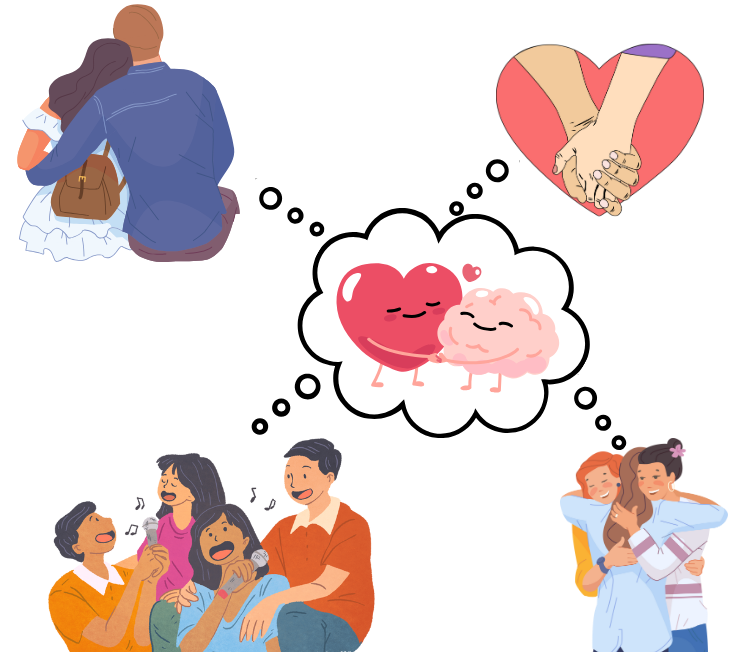A healthy heart is the key to a healthy brain, in more ways than one. When it comes to mental health, positive and healthy relationships can help people be the best and happiest versions of themselves. Whether it is platonic or romantic, the love and relationships humans share with others help create the perfect recipe for self-love.
Tobi Rouse, one of Briar Woods’ student counselors says, “We look at the strengths we have around us when things are hard, and one of the sources of strengths is positive friendships. Whatever those friendships look like, they are really crucial in helping us navigate things when things are hard.”
According to Clinicas, “studies show that people who are in happy relationships tend to feel less stressed” than those who are in unhealthy relationships or none at all. Being able to be open and honest with others, and also being able to be an “active listener” can reduce anxiety and cause a feeling of being supported by those around you, increasing your mental well-being, says the United Kingdom National Health Service.
Love, and the feeling of being in love, can also boost your mental health. According to Nuvance Health, “healthy love promotes belonging and purpose, and in turn, can boost mood and decrease anxiety, stress and depression. Conversely, the absence of love or loss of love can have the reverse effect.” Love also provides “the perfect environment to grow and thrive” as a healthy relationship can make you feel protected and confident, says High Country Behavioral Health, or HCBH.
Luminis Health gives the science behind why being in love makes people feel happier, and why love in general boosts mental health. When a person is in love, the brain releases chemicals like dopamine and adrenaline, making a person feel good. Over long-time relationships, the endorphins and hormones that the brain produces create a feeling of well-being and security, further promoting your mental health.
HCBH also gives some overlooked effects of healthy relationships. Not only does one simply feel happier in a healthy relationship, love can also increase the feeling of self-worth, promote healthier habits, increase resilience against negative emotions, and provide emotional support through the rough patches in life.
Briar Woods’ Student Assistance Specialist, Jashan Grewal, talks about support systems being important to a student’s educational success. “[Support systems] add value to what you are doing…which then enhances what you are learning.”
Rouse says, “When your relationships are healthy, you start to see the people around you as a team rather than competitors.”
Grewal also goes on to talk about the importance of these support systems when making a big change in your life, such as going to college or continuing your education. “Having a support system going into higher education, post-high school, is important because that is a big life change which, for most people, is a good change, but also promotes stress. If you have support systems in place, if you have people you’ve already relied on through high school, it’s easier to reach back out. It’s like muscle memory.”
However, it is important that the relationships that you create stay healthy. Unhealthy relationships can have a negative impact on mental health by promoting feelings of worthlessness and lowering one’s self-esteem, causing anxiety and depression.
Grewal says, “A healthy relationship constitutes of a lot of things, and one of the things I like to focus on is healthy boundaries…around what we can and cannot do. If we’re able to put that into place, we can weed out…who we can connect with on what level.”
“The people that you surround yourself with don’t have to all be just like you, …and when they appreciate what’s different about you and you appreciate what’s different about them, …it’s something and someone that will cheer you on,” says Rouse.
Finally, the most important relationship is the one humans have with themselves. VCU Health says that “self-compassion and self-love do have a strong impact on our mental health and our emotional state, both in terms of decreasing anxiety, depression, anger and loneliness and also increasing support and encouragement for ourselves.”
“You need to be happy to be happy in a relationship with someone else,” says Rouse.
In the end, no matter if it is platonic or romantic, or even with one’s self, the feeling of love helps boost mental health by promoting happiness and well-being, and decreasing feelings of anxiety or depression, creating a perfect environment to be the best that one can be.
As Rouse says, “It just goes a long way knowing that you have people that are excited about how you do things in the world.”






